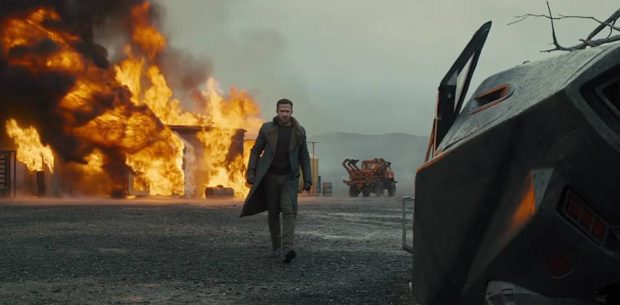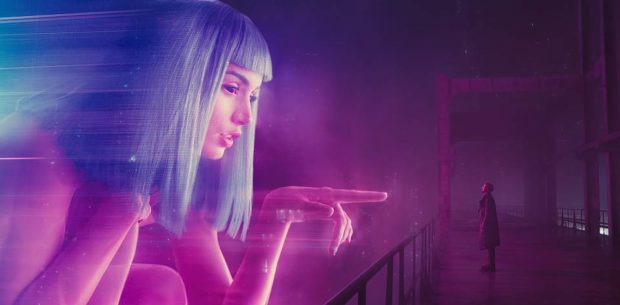Blade Runner is arguably one of the most influential sci-fi films of the last few decades. It’s difficult to even imagine what the landscape would look like without Ridley Scott’s future noir. BLADE RUNNER 2049 doesn’t try to reinvent the wheel so much as alter its shape.
Set 30 years after the events of the first film, replicants have now been upgraded to new legal models, with their obedience ensuring their integration into society. Detective K (Ryan Gosling) is a Blade Runner charged with hunting down illegal older models and ‘retiring’ them. After finding old-school skin job Sapper Morton (Dave Bautista), K uncovers details that could crack open the fabric of the delicate human/replicate society.
Returning screenwriter Hampton Fancher and Michael Green’s script is more concerned with exploring K’s world than any particular sense of urgency. BLADE RUNNER 2049 might begin with some large-scale action, but soon settles into the detail. His domestic life is reminiscent of Alain Delon’s hitman in Le Samouraï, save for a romantic subplot with the holographic Joi (Ana de Armas).
Yet while this sometimes acts in the film’s favour, there’s an inherent weakness to the approach. With a seemingly endless series of story strands, a number of which fail to bloom even in the weighty 163 minute running time, director Denis Villeneuve falls into the same trap as Arrival by over-explaining and complicating what should be simplicity itself. Indeed, the laden second act is simply dull, more concerned with style than substance.
Which makes this incredibly problematic as a sequel, abandoning the understated aesthetics of the 1982 original and turning the lights all the way up. Gone is the subtlety, the noir, and even the gorgeous soundtrack. In its wake is a score that has Hans Zimmer’s oppressive fingers all over it, blasting the senses into smithereens instead of conjuring audible tendrils of smoke out of thin air.
BLADE RUNNER 2049 still has a great deal to offer, and it certainly fulfils some of its promise in being a modern take on a classic. Almost every frame is profoundly beautiful. There’s room to contemplate some of the Big Issues that plague our own world, while still leaving us with a certain ambiguity. It’s also hard not to get a little bit excited about seeing Harrison Ford back as Deckard, who has a much meatier role than publicity would indicate.
Yet it’s a film that invites you to compare the two Blade Runner films with its deliberate callbacks beginning in the opening shots, and the comparison was never going to be favourable to the newer model. It’s a shame they don’t make them like they used to. Then again: who does?
[stextbox id=”grey” bgcolor=”F2F2F2″ mleft=”5″ mright=”5″ image=”null”]2017 | US | DIR: Denis Villeneuve | WRITERS: Hampton Fancher, Michael Green | CAST: Ryan Gosling, Harrison Ford, Ana de Armas, Sylvia Hoeks, Robin Wright, Mackenzie Davis, Carla Juri, Lennie James, Dave Bautista, Jared Leto | DISTRIBUTOR: Sony (AUS) | RUNNING TIME: 163 minutes | RELEASE DATE: 5 October 2017 (AUS) [/stextbox]







